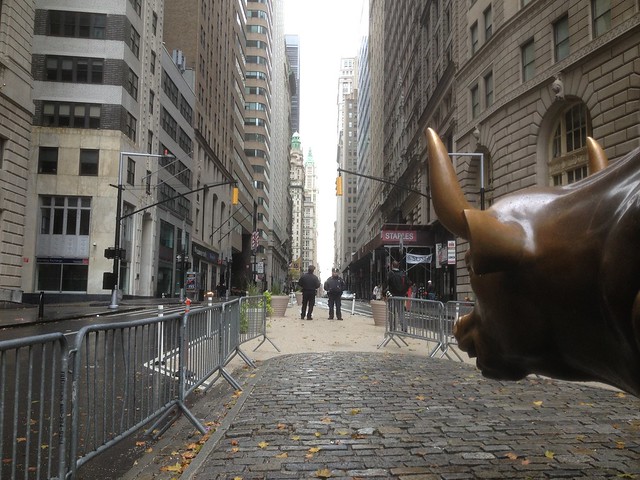Palestine has just received an upgrade in its international status at the UN, which could allow the disenfranchised state to bring legal grievances against Israel in an unprecedented way.
Like the majority of people, you probably have a hard time getting your head around the ongoing struggle between Israel and Palestine. I've spent 7 months there, have studied mid-east politics, and dialog with Palestinians, Israelis, Muslims, Jews, and internationals about it often, and I still find it very unclear at times. I find this video both instructive and clear-minded. It is fair, without compromising any core truths by equating the two peoples' situations. I'd suggest it to anyone interested in a clearer understanding of the struggle.
I should say, as well, that I appreciate any feedback on this perspective, including disagreements, especially feedback that isn't inflammatory, dogmatic, intentionally misleading, or reductive.
Read More......
Friday, November 30, 2012
Tuesday, November 27, 2012
Bicycle Times Review: With My Own Two Wheels
As I'm putting together an interview with Jacob Seigel-Boettner, the main man behind last year's excellent film With My Own Two Wheels, I thought I should resurrect an old review I published in Bicycle Times last year. Be sure to watch Jacob's film, and stay posted for the full interview.
We know bikes. We are with them every day, know their weight after long hours around town or races in the mud, and can take them apart blindfolded. Some of us can even weld them together from quiet tubes, or have ridden them across continents and countries. But once in a while, something comes along that causes us to simultaneously re-evaluate the basics of the bicycle and fall in love with it all over again. Filmmakers Jacob and Isaac Seigel-Boettner and Ian Wexler have done exactly that in their film With My Own Two Wheels, an easy yet ambitious documentary that spans four continents and five stories about the empowering nature of the humble bicycle.
A feeling of hope pervades the film, though it showcases very serious problems. The filmmakers introduce such diverse issues as physical disability, women’s empowerment, and the AIDS epidemic, and in each case highlight a person who is enabled through their bicycle to do more in the world.
We meet Carlos of Maya Pedal, in Guatemala, who builds Frankenstein human-powered machines that make agricultural work easier. Soon after, we roll down a dirt road with Bharati and a bunch of other sari-clad Indian girls given a chance at a future in a patriarchal society because someone gave them a bike to get to school. Shot after shot is beautiful, and though the film is short, you get a sense of intimacy with each subject. The camera lingers and treats us to their routines, their ambitions, exploring rich ways of life across the globe. Pedal power links them all, as do cunning little connecting sequences of each person gathering water, early morning tooth brushing, and, luckily for us, exquisitely lit gardens and healthy blue skies.
It is a pleasure to watch, but With My Own Two Wheels is still all about informing the viewer. Now and again statistics are subtly worked into the landscape, following the characters as they ride across it. It advocates in a realistic, healthy way that is not a die-hard guilt trip. Thus a film about hard things in hard parts of the world escapes the death trap of the world-awareness genre: devolving into a condescending sob story that leaves the viewer with little plan of action or recourse.
In fact, most of the characters, far from being objects of pity, are quite enviable. Mirriam is a Ghanaian woman with a paralyzed leg who works as a mechanic. Able-bodied men come into her shop and are blown away by the fact that she’s competent. There is pure joy in the functionality of her story, the shop, the conservation of the bike resources there. It highlights her ability rather than her inability.
Of course we, the enamored wheelmen (and women), already know about the joy of two wheels. But in the context of resource scarcity and inequality, the simple power of a bike is much more evident. Access to a bike can help someone overcome disadvantage, or increase their aspirations in general, along with their quality of life. Further, the bicycle reminds viewers in the developed world that solving problems can happen on a sustainable, human scale. The simplicity, versatility and ubiquity of the machine makes applying oneself in a positive way even easier, because you need just reach out within your community and find the way to do good work that suits you. The possibilities are infinite, and With My Own Two Wheels shows us some excellent places to start. Read More......
We know bikes. We are with them every day, know their weight after long hours around town or races in the mud, and can take them apart blindfolded. Some of us can even weld them together from quiet tubes, or have ridden them across continents and countries. But once in a while, something comes along that causes us to simultaneously re-evaluate the basics of the bicycle and fall in love with it all over again. Filmmakers Jacob and Isaac Seigel-Boettner and Ian Wexler have done exactly that in their film With My Own Two Wheels, an easy yet ambitious documentary that spans four continents and five stories about the empowering nature of the humble bicycle.
A feeling of hope pervades the film, though it showcases very serious problems. The filmmakers introduce such diverse issues as physical disability, women’s empowerment, and the AIDS epidemic, and in each case highlight a person who is enabled through their bicycle to do more in the world.
We meet Carlos of Maya Pedal, in Guatemala, who builds Frankenstein human-powered machines that make agricultural work easier. Soon after, we roll down a dirt road with Bharati and a bunch of other sari-clad Indian girls given a chance at a future in a patriarchal society because someone gave them a bike to get to school. Shot after shot is beautiful, and though the film is short, you get a sense of intimacy with each subject. The camera lingers and treats us to their routines, their ambitions, exploring rich ways of life across the globe. Pedal power links them all, as do cunning little connecting sequences of each person gathering water, early morning tooth brushing, and, luckily for us, exquisitely lit gardens and healthy blue skies.
It is a pleasure to watch, but With My Own Two Wheels is still all about informing the viewer. Now and again statistics are subtly worked into the landscape, following the characters as they ride across it. It advocates in a realistic, healthy way that is not a die-hard guilt trip. Thus a film about hard things in hard parts of the world escapes the death trap of the world-awareness genre: devolving into a condescending sob story that leaves the viewer with little plan of action or recourse.
In fact, most of the characters, far from being objects of pity, are quite enviable. Mirriam is a Ghanaian woman with a paralyzed leg who works as a mechanic. Able-bodied men come into her shop and are blown away by the fact that she’s competent. There is pure joy in the functionality of her story, the shop, the conservation of the bike resources there. It highlights her ability rather than her inability.
Of course we, the enamored wheelmen (and women), already know about the joy of two wheels. But in the context of resource scarcity and inequality, the simple power of a bike is much more evident. Access to a bike can help someone overcome disadvantage, or increase their aspirations in general, along with their quality of life. Further, the bicycle reminds viewers in the developed world that solving problems can happen on a sustainable, human scale. The simplicity, versatility and ubiquity of the machine makes applying oneself in a positive way even easier, because you need just reach out within your community and find the way to do good work that suits you. The possibilities are infinite, and With My Own Two Wheels shows us some excellent places to start. Read More......
Saturday, November 3, 2012
Hurricane Sandy: Interviews and Photos

Flooded cars in a Goldman Sachs garage, Financial District.
The BBC got ahold of me for a total of 4 interviews the day after Hurricane Sandy hit New York. At that point it was mostly remarkable to me how isolated little-affected areas were from the devastation the storm visited upon their neighbors.
More photos after the jump...






Reflecting now, it is quite frustrating to think of all the able-bodied people who were idle while those in neighboring communities of Breezy Point, the Rockaways, and the Jersey shore were in full emergency response mode. Granted, many people volunteered, and the recovery effort is continuing, but the ongoing examples of selfishness are disappointing. Equally disappointing are your average people who are unable to care for themselves in this trying time, people unwilling to walk or bike across a bridge to get back to their job, unwilling to carpool with strangers. To me it's a disheartening foreshadowing of the way the first world will react when environmental and economic situations become more severe in the future. Read More......
Labels:
archive featured,
archive published,
BBC,
hurricane sandy,
interview,
journalism,
Photos,
sandy,
superstorm
Audio Archives from the Dada years
Unearthed a 2 year old recording of Luke Williams singing 'Bullets', by Tunng, in a room full of a bunch of us making noise at the Dada Factory. good times.
Read More......
Labels:
bootleg,
Luke Williams,
noise,
salt lake music,
The Dada Factory
Subscribe to:
Posts (Atom)



























